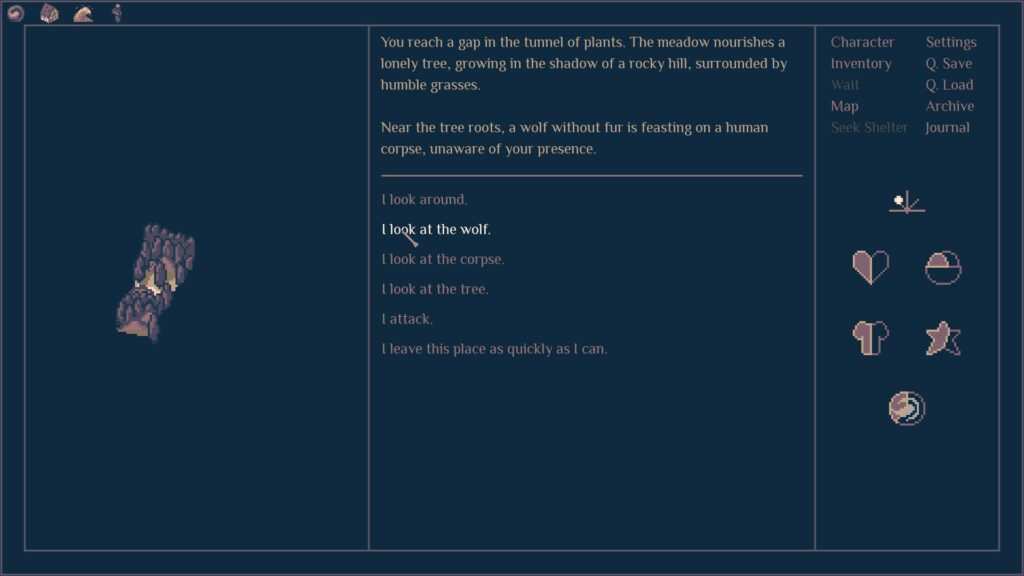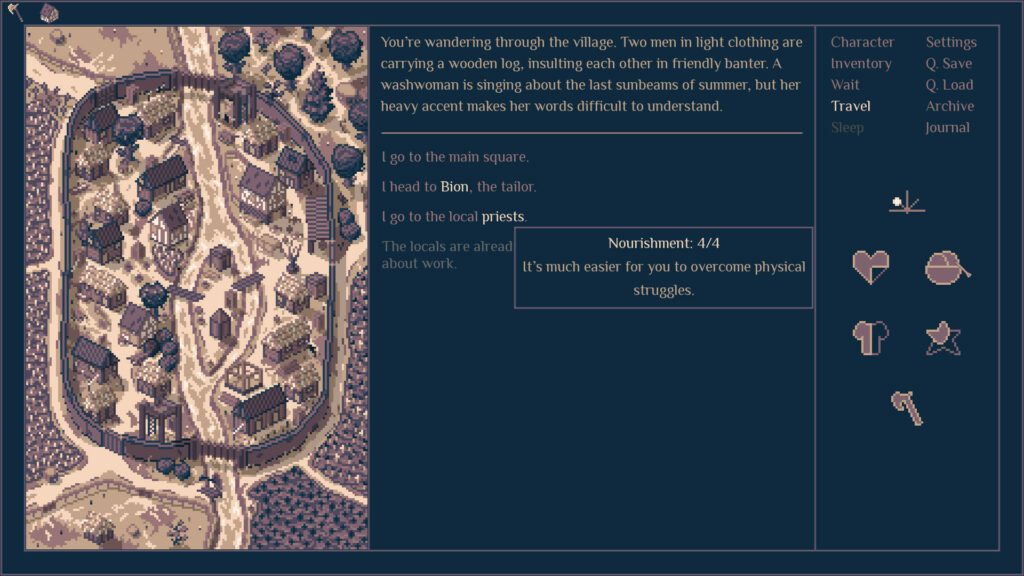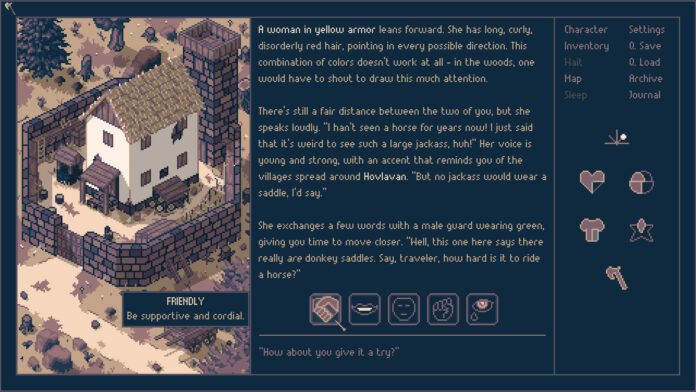REVIEW : Roadwarden (PC)
You spend a lot of your time in Roadwarden following in the footsteps of the previous roadwarden, Asterion, who was also sent into a swampy, forested peninsula to protect the paths from animals and the elements, care for a few villages, and assess the area’s resources on behalf of a merchant guild back in the big city. Asterion was responsible for tending to a few villages and protecting the paths from the elements. Despite Roadwarden’s Robin Hobb-esque historical fantasy setting, Asterion stalks the peninsula like the identity of the game’s protagonist in Disco Elysium. He is now known as a trail of broken promises, incomplete delivery, unfinished discussions, and ambitious ideas that seemed to have never materialised.

I’ll admit that when I first started the game, I had a little disdain for him. The setting of Roadwarden isn’t particularly large; it’s a single road looping a dense, watchful wilderness that was excavated from the fog of war, node by node, and many of the issues you run into appear trivial. A box of exquisite quills is being held for a monk. A large, flightless bird needs assistance being lassoed and brought under control by two foragers. You’re needed to reinforce a ford by a carpenter. This isn’t Dragon Age or Skyrim; instead, it’s a deceptively sleepy choose-your-own-adventure with deceptively delicate RPG add-ons. The game’s locations are described in terse but evocative detail, and dialogue options are nested within them. It also features gorgeous eight-colour isometric dioramas and a soundtrack that includes sombre guitar and animal sounds.
Every night you must find safe and, ideally, comfortable sleeping quarters because the woods are crawling with griffons, savage apes, and huge spiders; failing to do so could result in injury while travelling after dark. A bench in a tavern or a pile of furs in a shanty may be the best you can afford most nights, leaving you exhausted and unattractive in the morning.

You must consider your health, “vitality,” strength, or “nutrition,” as well as sanitation and tailoring. If you arrive in a town dressed in rags and filth, it may be difficult to get the people to offer you jobs or teach you about the outside world.
Most importantly, you need to be concerned about time passing since it moves forward whenever you travel or do an activity. You have 40 in-game days, from the end of summer to the beginning of autumn, to report back to the merchant guild.
After completing roughly half of my initial time-limited tour, I was treated to a torturous epilogue in which the results of my failures swiftly overcame my – what I thought to be notable – successes: communities torn apart by the imperial capital, then overrun by dark magic, leaving half of the settlements devastated and their secrets to fester. My heroine had the personal goal of constructing a new house on the peninsula, but she finally died as a mercenary several miles away, unappreciated and forgotten.
You’ll rely on your wits and insight far more than your axe blade even if you select a warrior background, which adds points to the game’s secret dice rolls during physical trials as long as you have enough vitality. I took on the role of a mediocre wizard with a pocketful of charms that let me Force Push groups of predators to damage or frighten them. However, I cast spells more frequently to heal myself while sleeping in uncomfortable circumstances or to detect curses and enchanted objects.

The individuals you encounter are all poor, yet they come in all different shapes and sizes. A hermit enchantress with a golem entourage, menacing men asking for directions in the deep forest, obtrusive youngsters, merry hunters, and outwardly cheerful mayors with hidden goals all have secrets that they might be willing to share if you do them enough favours or gain their favour. As part of a late-game scenario, I wasn’t able to reach during my playthrough, some will volunteer their services as companions.
The variety of decisions you can make in any given scenario, which again often depend on your local knowledge, reflects the complexity and imagination of the writing.
The following is a very incomplete list of the issues I’ve debated: Which colour should I use to illuminate a cave using magic? Does it make sense to purchase a shield that I don’t know how to use? Do I flirt or concentrate on the dice while I play poker with the village kids? Should I sit across from or next to someone I just met? Whom can I put my faith in to accurately translate a wax tablet? Can I determine a fellow traveller’s home country from their accent? Some of the puzzles need you to type in the phrases yourself, such as choosing what to concentrate on when faced with a huge spider or selecting who to ask for in a village where no one offers any information upfront.
Additionally, you’ll engage in a lot of haggling. One of the few fantasy games I’ve played, called Roadwarden, makes a convincing case for how the world works through the exchange of wealth and products. It is completely different from the impersonal, homogenising way most RPGs see money and resources, which are either taken from the simulation incidentally or, worse, taken away from your pleasure of the locations and their histories.
You will discover employment, shelter, foraging locations, and the occasional treasure as long as you keep following the roads and looping the forest, all of which feed back into the game’s web of narratives. When to brave the peninsula’s lone shortcut—a forgotten trail right through the wilderness where you’ll encounter the worst creatures—is a crucial decision. There are missions to complete here, but you may also go more quickly thanks to the forest road as the days get shorter and the weather gets less merciful.
Roadwarden never forgets that you’re an invader, which is one of its strongest traits among heroic fantasy role-playing games. The act of discovery is usually tinged with guilt, assuming you don’t actively embrace your reputation as a guild spy. You will inform your employers of every wonderful aspect of a person or place so they can more effectively drain the area of money. When my time in the guild expired, I was immediately sent back to the city, as the Roadwarden guild does not allow members to leave at will.

However, it does offer chances to progressively put oneself on a different course. It has a particularly clever effect on how you construct the imperial culture you stand for when portraying your home city to the people. How has the city fared since that recent, terrible war? Is that notoriously dangerous backstreet still a haven for criminal activity, or has it been transformed? Are the people still largely puritanical, or has a sexual renaissance occurred as a result of the need to use a bathroom during sieges? You can imagine your society in response to the game, win people over with ideas of a post-war urban utopia, or indulge your pessimism as you explore this world’s periphery and centre. I’m not positive, but I have a hunch that the epilogue you receive will depend on how harsh or forgiving, greedy or kind you make the city of your employers throughout these conversations.
REVIEW : Train Life: A Railway Simulator (PC)



![PlayStation : Evo Japan 2024 Day 1 Watch Party [ENGLISH]](https://www.hgunified.com/wp-content/uploads/2024/04/maxresdefault_live-6-218x150.jpg)
![PlayStation : Evo Japan 2024 Day 2 Watch Party [ENGLISH]](https://www.hgunified.com/wp-content/uploads/2024/04/maxresdefault_live-5-218x150.jpg)









